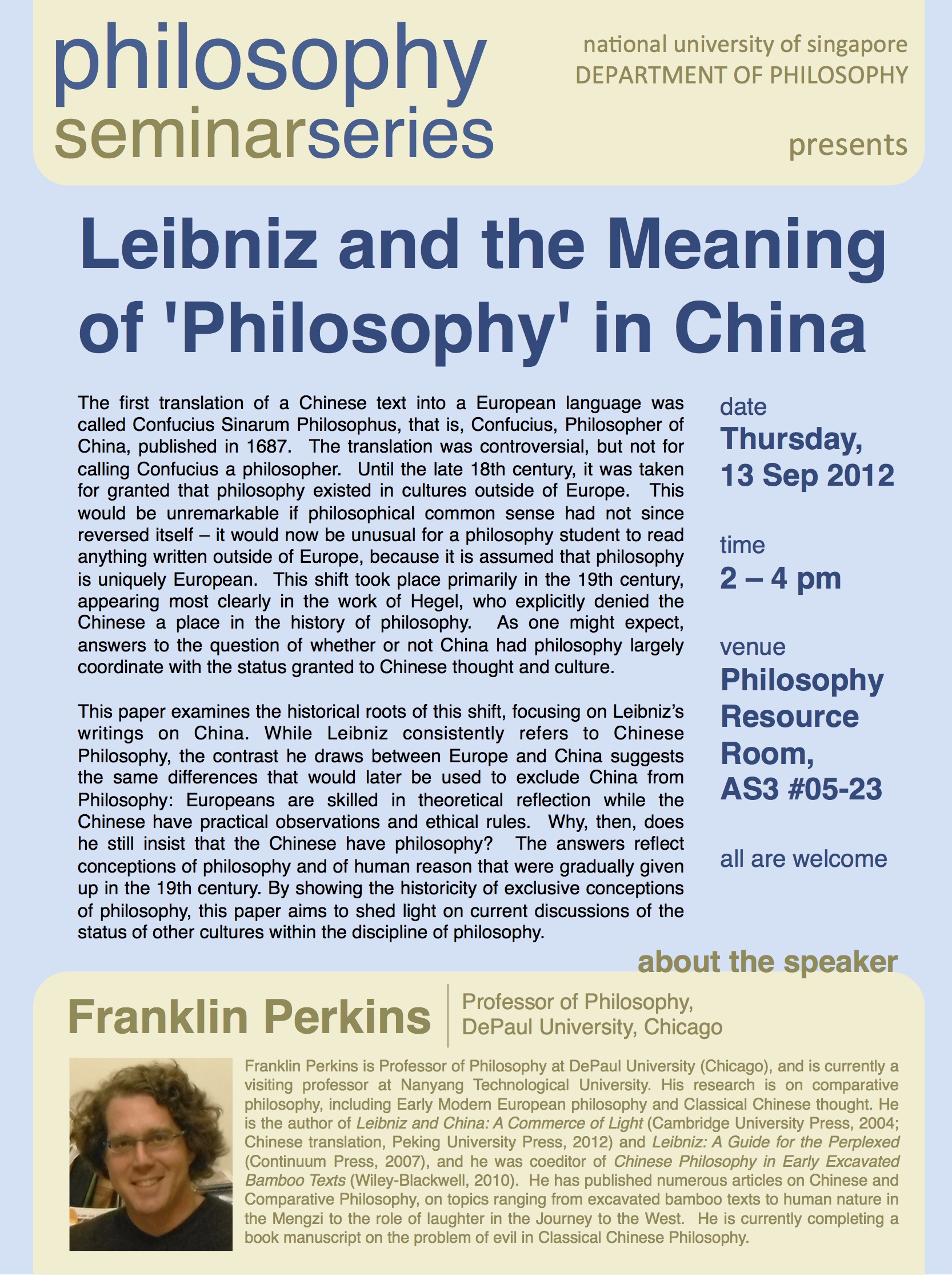The first translation of a Chinese text into a European language was called Confucius Sinarum Philosophus, that is, Confucius, Philosopher of China, published in 1687. The translation was controversial, but not for calling Confucius a philosopher. Until the late 18th century, it was taken for granted that philosophy existed in cultures outside of Europe. This would be unremarkable if philosophical common sense had not since reversed itself – it would now be unusual for a philosophy student to read anything written outside of Europe, because it is assumed that philosophy is uniquely European. This shift took place primarily in the 19th century, appearing most clearly in the work of Hegel, who explicitly denied the Chinese a place in the history of philosophy. As one might expect, answers to the question of whether or not China had philosophy largely coordinate with the status granted to Chinese thought and culture.
This paper examines the historical roots of this shift, focusing on Leibniz’s writings on China. While Leibniz consistently refers to Chinese Philosophy, the contrast he draws between Europe and China suggests the same differences that would later be used to exclude China from Philosophy: Europeans are skilled in theoretical reflection while the Chinese have practical observations and ethical rules. Why, then, does he still insist that the Chinese have philosophy? The answers reflect conceptions of philosophy and of human reason that were gradually given up in the 19th century.
By showing the historicity of exclusive conceptions of philosophy, this paper aims to shed light on current discussions of the status of other cultures within the discipline of philosophy.
Philosophy Seminar Series.
Date: Thursday, 13 Sep 2012
Time: 2pm – 4pm
Venue: Philosophy Resource Room (AS3 #05-23)
Speaker: Franklin Perkins, Professor of Philosophy, DePaul University, Chicago
Moderator: Dr. Neil Sinhababu
 About the Speaker: Franklin Perkins is Professor of Philosophy at DePaul University (Chicago), and is currently a visiting professor at Nanyang Technological University. His research is on comparative philosophy, including Early Modern European philosophy and Classical Chinese thought. He is the author of Leibniz and China: A Commerce of Light (Cambridge University Press, 2004; Chinese translation, Peking University Press, 2012) and Leibniz: A Guide for the Perplexed (Continuum Press, 2007), and he was coeditor of Chinese Philosophy in Early Excavated Bamboo Texts (Wiley-Blackwell, 2010). He has published numerous articles on Chinese and Comparative Philosophy, on topics ranging from excavated bamboo texts to human nature in the Mengzi to the role of laughter in the Journey to the West. He is currently completing a book manuscript on the problem of evil in Classical Chinese Philosophy.
About the Speaker: Franklin Perkins is Professor of Philosophy at DePaul University (Chicago), and is currently a visiting professor at Nanyang Technological University. His research is on comparative philosophy, including Early Modern European philosophy and Classical Chinese thought. He is the author of Leibniz and China: A Commerce of Light (Cambridge University Press, 2004; Chinese translation, Peking University Press, 2012) and Leibniz: A Guide for the Perplexed (Continuum Press, 2007), and he was coeditor of Chinese Philosophy in Early Excavated Bamboo Texts (Wiley-Blackwell, 2010). He has published numerous articles on Chinese and Comparative Philosophy, on topics ranging from excavated bamboo texts to human nature in the Mengzi to the role of laughter in the Journey to the West. He is currently completing a book manuscript on the problem of evil in Classical Chinese Philosophy.
